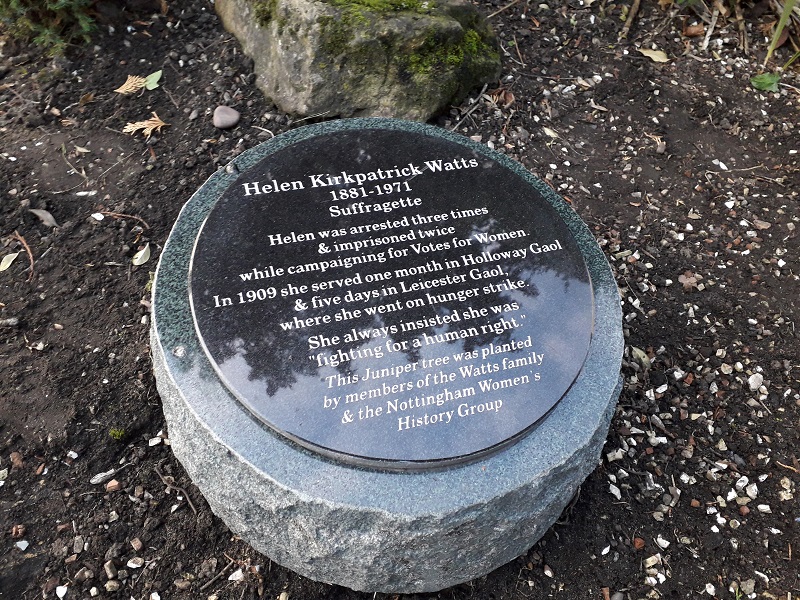
14th December 2018 marks the date in British history when some women were able to go to the ballot boxes for the first time and cast their vote in the General Election after the passing of the Representation of People Act. Exactly 100 years later, Nottingham pays tribute to suffragette Helen Kirkpatrick Watts with the unveiling of a stone plaque in the city’s Arboretum to celebrate her involvement and achievements. Nottingham Women’s History Group were joined by members of Helen’s family, the Sheriff of Nottingham Catharine Arnold and members of the public to reveal the plaque, installed beside the juniper tree planted in her honour in 2016.

Helen Kirkpatrick Watts was born in 1881 in Durham, and moved with her family to Nottingham in 1893 when her father became the Vicar of Holy Trinity in Lenton. Inspired to join the Women’s Social and Political Union (WSPU) after hearing Christabel Pankhurst speak at a meeting in December 1907, Helen dedicated herself to the suffragette cause and became a key figure in establishing the Nottingham branch.
She was imprisoned twice for her activism in 1909, first in Holloway following her involvement with a demonstration outside the House of Commons and subsequently was arrested in Leicester for demonstrating outside a meeting at which MP Winston Churchill was due to speak. Following her release, she became a highly sought-after speaker at meetings and events. Using her lively and practical mind to present a balanced and thoughtful view of the suffragette cause, she reminded audiences that most suffragettes were ordinary women with everyday concerns and raised debates on many other issues including low wages, insurance and pension rights, and wider gender politics.
In a speech she gave not long after her release, she spoke with impassioned eloquence about the importance of organisation and joining together in public solidarity to appeal to those she saw as the real sovereign power of this country – the people. In her own words, "Votes for women will not be won by drawing-room chatter... it has got to be fought for in the market-places, and if we don't fight for it, no one else will."
Perhaps the most intriguing element of her story is that it might so easily have been lost to history, were it not for a curious discovery in a Bristol dockyard in 1980. Responding to an advert in a local paper by a student undertaking a history project on the Suffragettes, a dock worker brought to light the existence of an unclaimed trunk which he believed might contain items of interest. Contained within were the correspondence and speeches of Helen Watts, documenting her involvement with the suffragette movement in Nottingham. This valuable resource was passed on to the Nottinghamshire Archives, and provide a fascinating insight into the dramatic tale of a vicar’s daughter turned activist, and the suffragette movement itself.
This blog was written by Claire Jones, Marketing Assistant at Visit Nottinghamshire.
Related
Comments
Gemma Fantastic to see Helen Watts honoured in this way. My Dad was the one who saved the Helen Watts papers and sent them to Nottingham Archive Office!
 to add an item to your Itinerary basket.
to add an item to your Itinerary basket.











